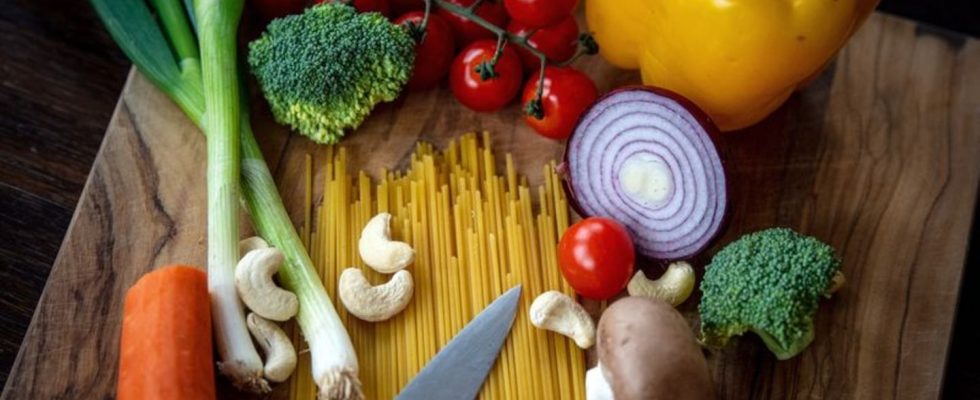Resolutions
“Dry January” or “Veganuary”: What are the trends?
Many people try a vegan diet in January. (Illustration) Photo
© Sina Schuldt/dpa
Poor January! The month at the beginning of the year is now more often required to be alcohol-free and meat-free. Isn’t that asking a bit too much? And does the lifestyle change really work?
Welcome to January: Next to November, it is the most unpopular month in Germany – this was the result of a representative survey among adults. No wonder, because January often feels particularly dark because of the disappearing Christmas lights, the days are only slowly getting longer, the mild spring is still a long way off – and summer anyway. And under these circumstances, many also struggle with their good ones New Year’s resolutions.
Two campaigns seem to have become popular recently: namely, taking a break from alcohol in January (“Dry January”) or not consuming any animal products for a few weeks (“Veganuary”).
Doesn’t this place too much burden on the turn of the year and poor January? “Actually yes,” says psychologist Sonia Lippke. Research also shows this. “We have carried out scientific studies – also on general goals and their implementation,” says the professor from the Constructor University in Bremen. “And we found that it makes sense all year round to set goals, plan carefully and put the bastard on a leash instead of demonizing him. This helps people to be more satisfied with themselves and to adapt accordingly behavior – and not just in relation to alcohol or diet.”
Temporary measures have limited effect
But catchy trends like “Dry January” or “Veganuary” aren’t bad, says Lippke. “Because they are more likely to be acted upon, and if you are successful, then you can remember those positive experiences in other attempts.” A disadvantage may be that “temporary measures only have a limited effect on health and well-being”. “Lifestyle change can’t happen in a single month. But January can be a catalyst.”
Psychologist Sebastian Bartoschek also says: “At the beginning of the year, many people have the feeling that something new is beginning. And with the new beginning it should also get better.” In a way, resolutions were simply part of the social mindset of our society. “Psychologically speaking, it’s mostly about a kind of self-optimization: finding yourself better, becoming what you believe you should be.” Often it’s about losing weight or eating less meat and drinking less alcohol. “This is also where the campaigns that suggest a “Dry January” or “Veganuary” come in. They are good in that they do not set resolutions forever, but initially only limit them to a period of time.”
Don’t aim too high
Setting goals that are too high is always unfavorable, says the psychologist. “If I resolve to go to the gym for two hours five times a week or to never eat meat or drink alcohol again, then it often quickly becomes clear: I won’t be able to do that, I’ll fail.” It’s important, says Bartoschek, to ask yourself: Can I manage this specifically and can I incorporate it well into everyday life? “You should also always ask yourself: Am I really doing this for myself or for someone else or other people’s image of me?”
If you don’t have to immediately stay away from alcohol or meat for health reasons, you can also try not to try for a period of time like you would with a diet, i.e. Dry January or Veganuary, but simply to eat less of both in the long term says Bartoschek. “So that means, for example, no longer eating meat on Fridays or several days of the week. Don’t drink alcohol on weekdays. This is controllable. I can check off these resolutions and I can check in a relaxed and relaxed manner whether I have stuck to them or not not.”
Incidentally, a representative Forsa survey commissioned by DAK-Gesundheit recently showed that when it came to good resolutions for 2024, “Eat less meat” and “Drink less alcohol” actually ended up at the bottom. For many of those surveyed, however, it was far more important to avoid stress, exercise more and, above all, take more time for family and friends.

